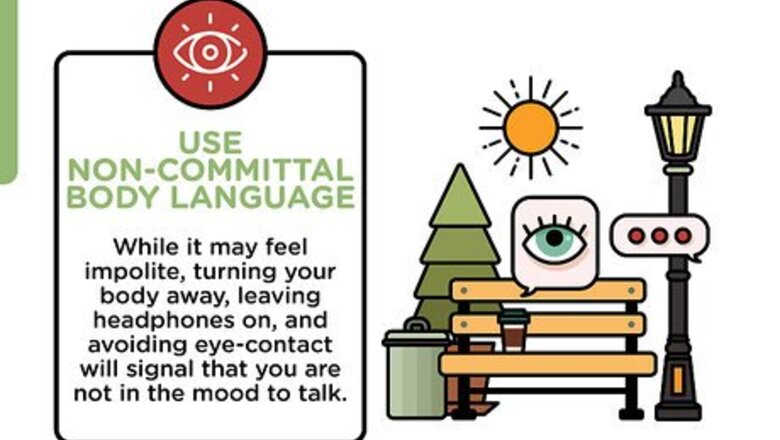
views
Sending Signs that You Are Disinterested

Use non-committal body language before the conversation begins. While it may feel impolite, turning your body away, leaving headphones on, and avoiding eye-contact will signal that you are not in the mood to talk. This may save you from directly telling someone to shut up later on. Keep working on whatever activity you were doing when they interrupted. Get up and move around, be active, and find little chores to do instead of listening. Reader Poll: We asked 3954 wikiHow readers about the biggest tells that someone doesn’t want to talk to you, and only 6% said having a distant body position. [Take Poll] So, if you want to avoid talking to people, crossing your arms or avoiding eye contact might be a better approach.

Interrupt them as soon as you can. Saying things like, "I'd like to add something," or "If I could interrupt you for just a moment," will often let someone know that they are talking too much. While people often talk quickly, capitalizing on a breath or a brief moment of silence can break the one-sided flow of discussion. Signal that you would like to speak by holding up your hands, opening your mouth, or clapping. Anything to break their train of thought and get a chance to talk works. If they ask to finish their thought, don't let them continue to steamroll the conversation; interrupt them once they finish their sentence.

Lead the conversation. This is especially helpful when dealing with someone you talk to frequently. Let the person know that you listened to them and steer the discussion in another direction.
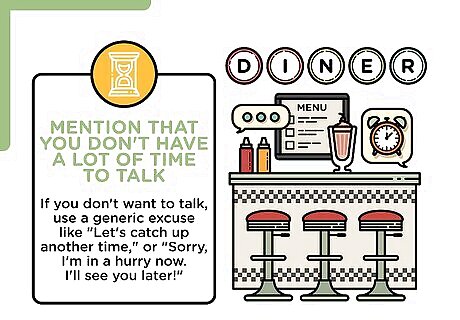
Mention that you don't have a lot of time to talk. Phrases like "I would love to chat, but I'm swamped with work right now," "Today's not a great day to talk, I have a lot of errands," and "I unfortunately can't devote my full attention to you right now," will allow you to easily wiggle out of the conversation later on. If you don't want to talk, use a generic excuse like "Let's catch up another time," or "Sorry, I'm in a hurry now. I'll see you later!" If you are constantly being talked over, recognize that you must be more direct.
Abruptly Ending Conversations
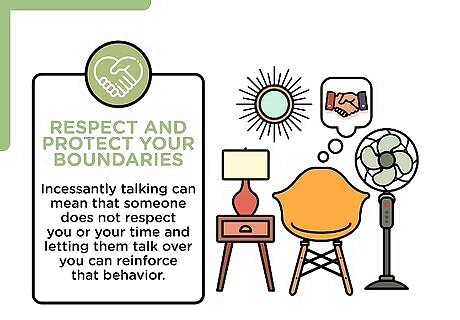
Respect and protect your boundaries. Telling someone to "shut up," even politely, is difficult for people who are generally nice and friendly. But if someone is being offensive, aggressive, or even taking too much of your time, you need to take a stand for yourself. Ending a conversation does not mean ending a friendship, so don't be afraid. Incessantly talking can mean that someone does not respect you or your time, and letting them talk over you can reinforce that behavior.
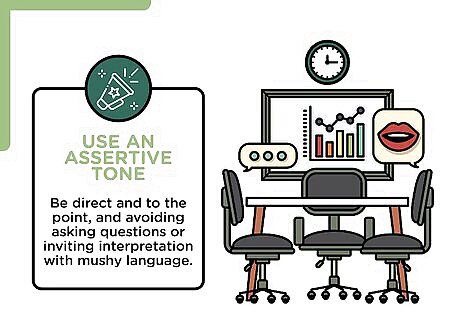
Use an assertive tone. Be direct and to the point, and avoiding asking questions or inviting interpretation with mushy language. Don't say, "Would you mind if I kept working?" Say "I'm getting back to work now." Make eye contact and speak clearly. Raise your voice if you need to be heard, but try to keep your tone level and steady. Use declarative (ie. "I am") sentences instead of questions or conditional ( ie."If you...") phrases Example: avoid saying, "Well, I'm kinda busy right now." Instead, say, "I've got a lot to do, and I unfortunately do not have time to talk."

Inform them that they have crossed a line if they are offensive. When someone is being crude or hurtful, tell them that you would rather not talk about it and that they can have a nice day. Engaging aggressive talkers will only make them louder and angrier, so take the high road and leave. Example: "That's enough. I am not going to tolerate that sort of language." Ignore any further comments. Know the line between conversation and harassment, and ask for help if you feel threatened.
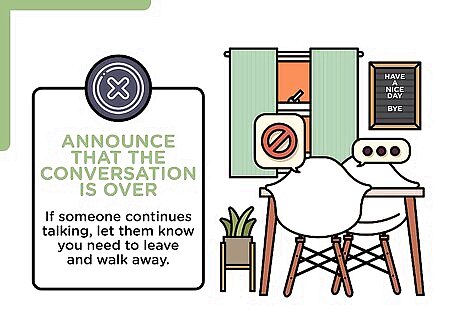
Announce that the conversation is over. If someone continues talking, let them know you need to leave and walk away. Be polite but confident, and don't linger if they "have one last point." You have done everything you could to end the conversation peacefully, so don't feel badly if they still don't respect your time. Example: "It's been great talking to you, but I am going to go now." If you've actually found the conversation enjoyable, but don't have time for it right now, make an effort to show you would like to stay in touch. Example: "I’ve enjoyed talking to with you and would like to continue this conversation another time. Would you be open to meeting for lunch sometime?"
Ending Conversations with People You See Often

Listen for a reasonable amount of time. Actively listening to someone will help you determine not only what someone is talking about, but potentially why they are talking so much. While some people talk a lot because of egos or aggression, some people talk because they are nervous, want to make friends, or have something on their chest. Knowing why people won't shut up will help you end the conversation gently. Ignoring people, creating conflict, or feigning interest will all create longer conversations. Being polite but honest is usually best.
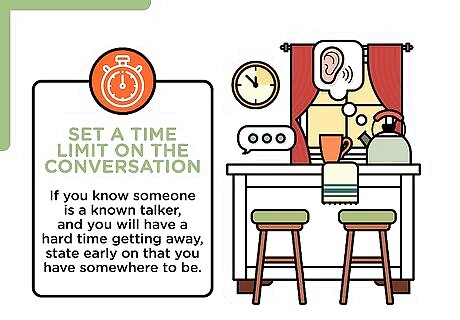
Set a time limit on the conversation. If you know someone is a known talker, and you will have a hard time getting away, state early on that you have somewhere to be. Example: "Great to see you, but I only have a few minutes to talk."
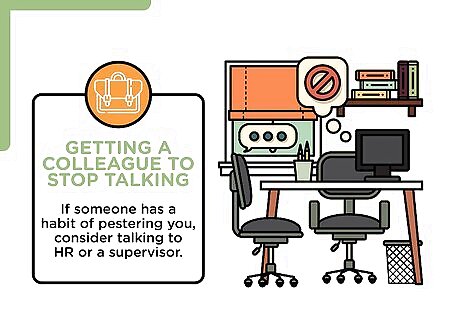
Getting a colleague to stop talking. When you are at work you often have your best opportunities to get some peace and quiet. Mentioning "that you have a deadline upcoming," you are "trying to focus more on work," or that "I would rather not talk about this at the office" can get you out of long or awkward conversations easily. If someone has a habit of pestering you, consider talking to HR or a supervisor. Example: "Great to see you, but I have only have 5 minutes!" Example: "I have to pick up the kids soon, so I need to run."
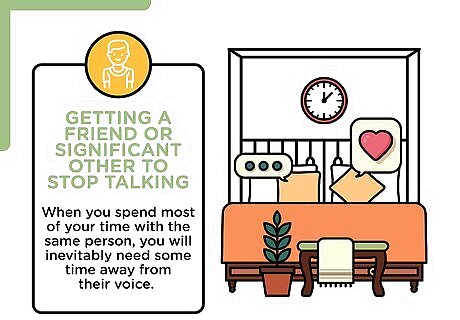
Getting a friend or significant other to stop talking. When you spend most of your time with the same person, you will inevitably need some time away from their voice. Most likely, they need time away from yours, too. Find activities together, like reading, movies, or mediation, that require silence. "I need some time to relax and think, let's talk in an hour." Spending some alone time will allow both of you to focus on what is really important, and be able to talk about it later. Example: "Today was the longest day! I could use a few seconds for some peace and quiet."

Get your parents to stop talking. We all love our parents, but they have a knack for talking our ears off. While you should always be respectful, there are a couple ways to get free without causing family drama. Sending letters or emails, and inviting them to do the same, will help you catch up on your own time. Be brief talking about problems or stress as many parents will want to know every last thing that is wrong in their child's life. Don't be a brick wall -- give them some details! If you are sullen and silent, many parents will try to keep talking to figure out what your problem is. Communicate regularly. It may seem counter productive, but giving periodic updates to your parents can prevent an information overload if you only talk once a month or year. Example: "I'm so glad we had the chance to catch up Mom, but I have to run. I'll call you soon!"
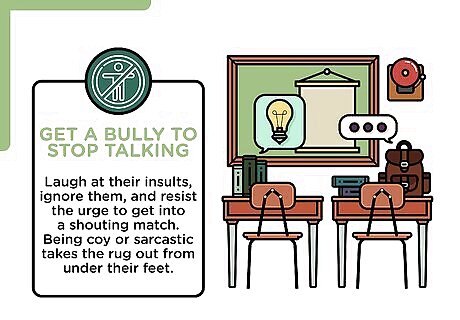
Get a bully to stop talking. Getting a bully to leave you alone can be tough, but getting them to shut up is often as simple as eliminating their ammo. Laugh at their insults, ignore them, and resist the urge to get into a shouting match. Being coy or sarcastic takes the rug out from under their feet. "Would your poor mother approve of that language?" "Someone watched one too many R-rated movies," or "Sheesh, did someone treat you poorly as a child?" are sarcastic, but resist being too hostile.


















Comments
0 comment